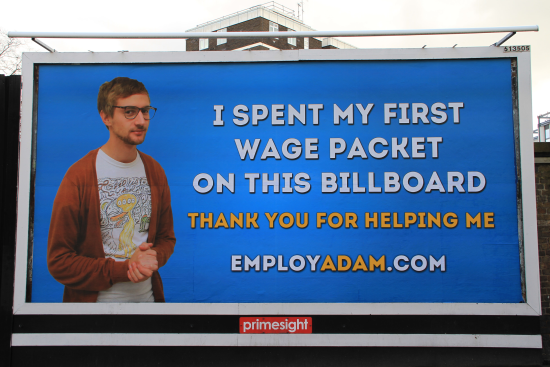Only last year, getting a job in the UK was believed to be near impossible. With businesses entering administration on a daily basis and employers reluctant to expand staff numbers in an uncertain at best economy, those who lost their jobs had little choice but to join the queues waiting to sign up for jobseeker’s allowance. Stories of job openings attracting several hundred applicants became the norm as members of Britain’s workforce attempted to earn enough money to pay for daily essentials, while luxuries such as new clothes and foreign holidays became out of reach for many – something which has had a devastating effect upon the retail and leisure industries.

Adam Pacitti successful secured a job after asking people for a job on a billboard
Unfortunately, while unemployment may have fallen to its lowest level in two years, families are still struggling to get by as wage growth has failed to keep up with the cost of living in post-recession Britain.
According to the Office for National Statistics unemployment dropped by 14,000 to 2.5 million in the last quarter of 2012, reducing the national unemployment rate to just 7.8 per cent. This means that the number of people claiming jobseeker’s allowance has correspondingly fallen sharply, having dropped to the lowest level in almost two years.
Employment increased greatly over the same period, with the workforce gaining an additional 154,000 members in only three months. As it stands the employment rate is currently set at 71.5 per cent with 29.73 million workers in employment of some sort by the end of 2012, which is the highest total since records began in 1971.
Iain Duncan Smith, the secretary of state for work and pensions, believes that input from the Government and job centres has contributed hugely to the increase in gainful employment.
He says; “The fall in long-term unemployment is particularly welcome and shows that the training and support we are offering is helping people move off benefits and into work.
“These figures show another big increase in full-time jobs, half a million more British people in work over the past year and more women in employment than ever before.”
Yet while employment has now reached record heights, the news when examined more closely is not necessarily so positive.
At present, the number of full-time workers in the UK is 378,000 lower than during the first quarter of recession between April and June of 2008, while part-time employment has risen by 572,000 when compared to the same period. While full-time employment is once more beginning to grow, by 394,000 in the last quarter of 2012, part-time employment is also seeing increases, of 190,000 in the same period.
The gap may be closing, yet presumably not quickly enough for workers attempting to get back into full-time employment after suffering redundancies as a result of the economic hardships. This is demonstrated by the fact that the number of people with more jobs grew to 1.1 million – a quarterly leap of 41,000 workers.
This could be due to the fact that the average worker can now no longer claim to be earning a proper living wage and as such must work longer hours or even two jobs in order to afford basic items.
Average annual wage growth, not including worker bonuses or incentives, currently sits at 1.3 per cent. This means that it has dropped by 0.1 per cent in only a month, and is now the lowest average wage rise since the financial crisis at the end of 2009.
Inflation, however, remains high at 2.7 per cent for the fourth consecutive month. Combined, these factors mean that workers are now effectively having their wages cut thanks to the high cost of living in the UK today.
Samuel Tombs, of Capital Economics, warns that hopes of the average worker earning a proper living wage in the near future will be shattered if the figures are anything to go by.
He says; “The latest labour market data indicate that the improving trend in employment shows no imminent signs of slowing.
“But the price of this resilience has been extremely weak growth in average earnings – indeed, the dip in the headline rate of average earnings growth excluding bonuses from 1.4 per cent to 1.3 per cent in December suggests that real pay is now falling at an annual pace of more than 1 per cent.”
Do you believe that reducing the number of Britons without any sort of job is more important than researching ways to bring down inflation, or should the fact that many do not earn enough to get by in their jobs be addressed first? How could the Government ensure that workers earn a proper living wage – is it a matter of forcibly upping the average earnings growth, thus risking mass redundancies, or offering incentives for employers to raise wages parallel with the rate of inflation?
Previous Post
California District Wants Fairer Property Tax
No related posts found for this post.